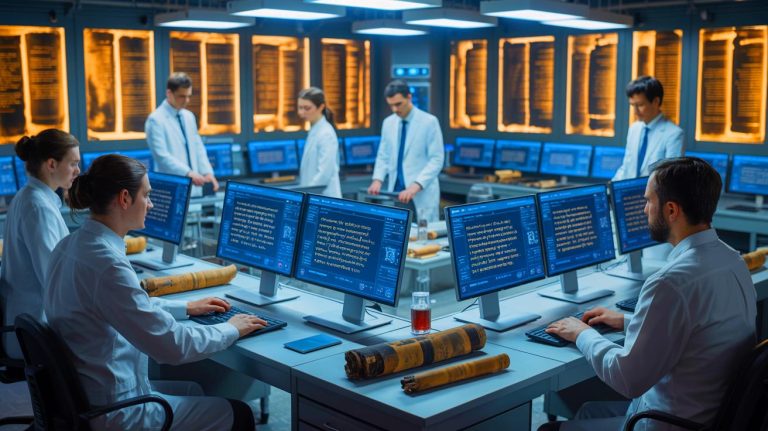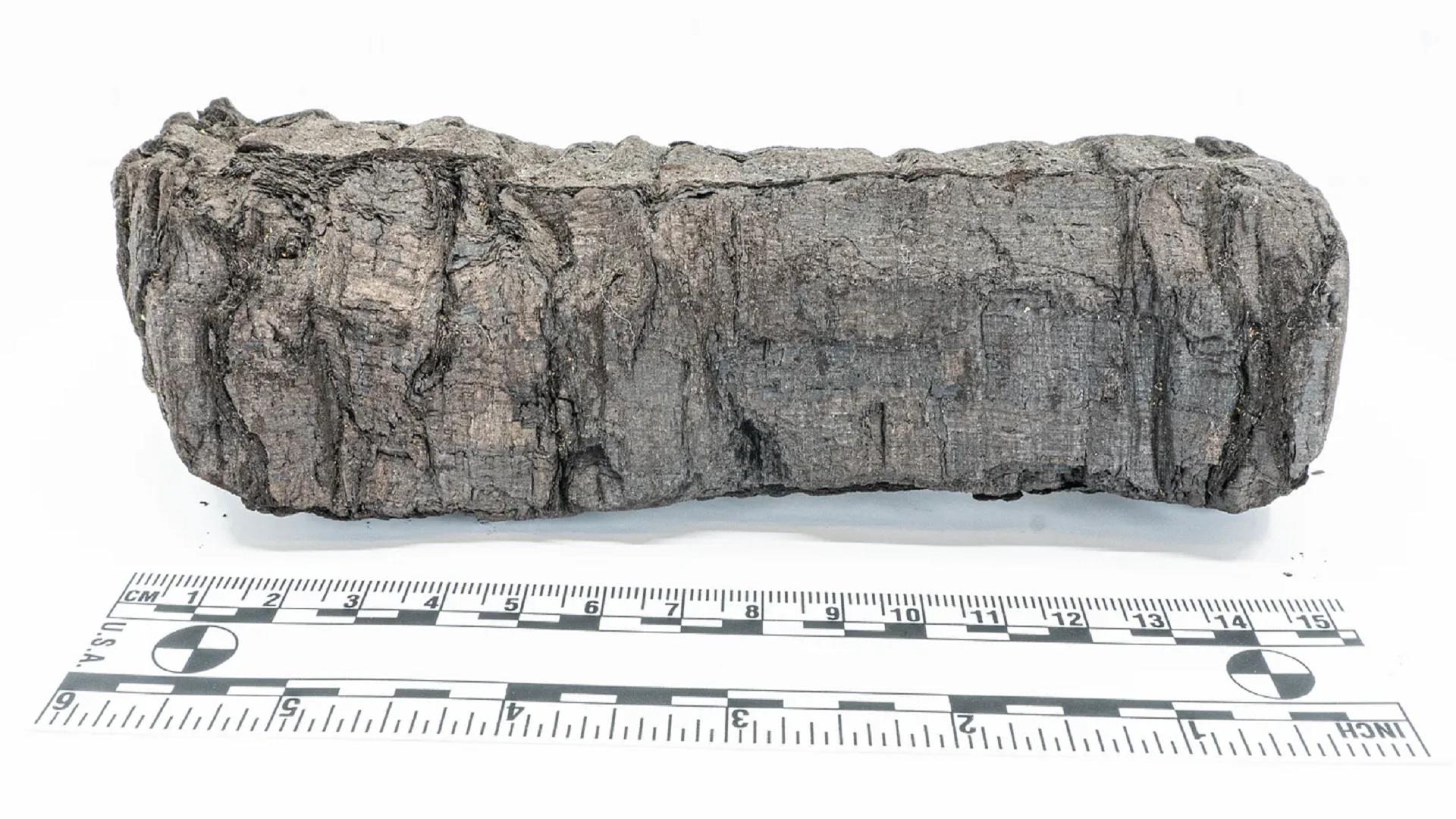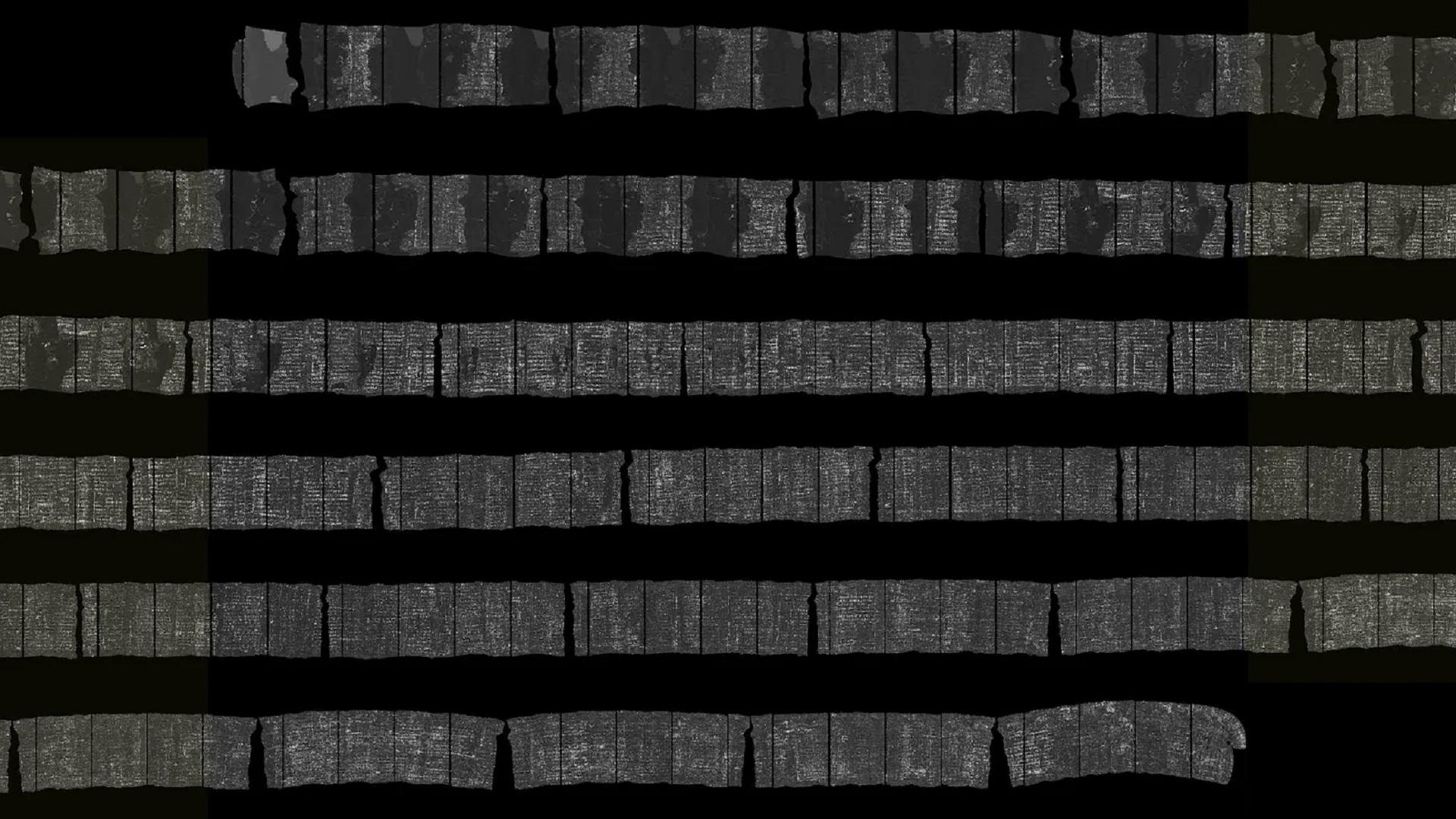| IN A NUTSHELL |
|
In an extraordinary feat of technological advancement, researchers have harnessed the power of AI to decode the secrets of ancient Greek scrolls without unrolling them. This breakthrough, part of the ambitious Vesuvius Challenge, has brought to light the works of Philodemus, particularly his piece titled “On Vices.” Such unprecedented discoveries offer valuable insights into the intellectual pursuits of the Roman elite, preserved for nearly two millennia beneath the volcanic ash of Mount Vesuvius. As we delve into this remarkable intersection of history and technology, we witness the revival of ancient wisdom through modern innovation.
Tech Breathes New Life into Ancient Texts
For centuries, the charred scrolls of Herculaneum, victims of the catastrophic eruption of Mount Vesuvius in 79 AD, posed a formidable challenge to scholars. The scrolls, so fragile that they disintegrated at the slightest touch, eluded traditional methods of reading, leaving their secrets buried under layers of volcanic ash. Previous attempts to unveil their contents often resulted in damage, making them inaccessible to historians and researchers alike. However, the advent of modern technology has transformed this narrative.
Utilizing high-resolution scans and sophisticated AI analysis, researchers have achieved what was once thought impossible: reading the scrolls without unrolling them. The project, involving students from the University of Würzburg and experts from the Vesuvius Challenge, has identified Philodemus as the author of one such scroll, titled “On Vices.” This achievement underscores the potential of technology to revolutionize our understanding of ancient texts, preserving them for future generations while unveiling the rich tapestry of historical knowledge they contain.
Epicurean Wisdom Unearthed Again
Philodemus, a prominent figure in the Epicurean school of thought, emphasized the pursuit of pleasure and ethical living. His works, discovered in the Villa of the Papyri, offer a rare glimpse into the philosophical discourses prevalent among the Roman elite. The scroll titled “On Vices” is believed to be part of a larger series, potentially its first volume, though this detail remains under scrutiny.
The Bodleian Libraries at Oxford University, custodians of these invaluable scrolls, have facilitated this groundbreaking research. The text, translated from Greek, delves into ethical considerations, juxtaposing vices with their opposite virtues. This discovery challenges previous assumptions, as researchers had initially believed the first volume of “On Vices” was a text on flattery. However, the contents of PHerc. 172 suggest otherwise, marking a significant milestone for the Vesuvius Challenge. This milestone not only enriches our understanding of Philodemus’ work but also signifies the first successful reading of a scroll’s content without physical intervention.
The Vesuvius Challenge: A Global Endeavor
The Vesuvius Challenge, launched in 2023, represents a global initiative aimed at deciphering the carbonized scrolls of Herculaneum without causing further damage. The project has brought together a diverse team of experts, including papyrologists, historians, and technology specialists, to unlock the secrets of these ancient texts. The collaborative effort has already yielded remarkable results, with significant breakthroughs occurring over the past few months.
In October 2023, researchers decoded the first full word from an unopened scroll using AI technology: “πορφυρας” (porphyras), the Greek word for “purple.” This was followed by another discovery in February, where the word “διατροπή” (diatrope), meaning “disgust,” was identified in PHerc. 172. These findings highlight the potential of the Vesuvius Challenge to revolutionize our approach to ancient texts, bridging the gap between history and modern technology in an unprecedented way.
From Ashes to Insights: The Future of Ancient Scrolls
The successful reading of PHerc. 172 marks a new era in the study of ancient texts. By combining cutting-edge technology with scholarly expertise, researchers have opened a window into the past, revealing the rich intellectual landscape of ancient Rome. This achievement not only underscores the resilience of human knowledge but also demonstrates the power of innovation in preserving our shared cultural heritage.
As we continue to explore the depths of these ancient scrolls, questions remain about what other secrets lie hidden within the layers of ash and time. What new insights into the philosophical and ethical considerations of the ancient world will be unveiled next, and how will these discoveries shape our understanding of history?
Did you like it? 4.5/5 (27)










Wow, AI is reading ancient scrolls now? What’s next, AI solving world peace? 🤖
How did they ensure the AI didn’t make mistakes in the translation?
Fascinating! Can’t wait to see what other ancient secrets we can unlock with AI. 📜
Is it just me, or does this sound like something out of a sci-fi movie?
The Vesuvius Challenge sounds like a superhero mission! 🦸♂️
Can this technology be used on other historical artifacts or just scrolls?
AI is amazing, but can we trust it with our ancient history?
I’m skeptical. How do we know the AI interpretation is accurate?
Philodemus? Sounds like a wizard from Harry Potter! 🧙♂️
Thank you for sharing this incredible advancement in reading ancient texts!
Will this tech eventually let us read the scrolls ourselves, like some kind of AR app?
I wonder if we’ll uncover any juicy ancient scandals in these texts. 😏
This is great, but what about the preservation of the actual scrolls?
Does this mean historians are out of a job? 🤔
Philodemus was ahead of his time. His thoughts on pleasure and ethics are still relevant today.
Anyone else think this could lead to a new Netflix documentary series?
I’m curious, how long did it take to decode the scroll using AI?
This is a milestone for AI, but how long before we can read all scrolls?
Thank you to all the researchers involved in this amazing breakthrough! 🙌
Is there a chance that the AI could misinterpret ancient idioms or context?
AI reading scrolls? What a time to be alive. 📜✨
Will they publish the full translation for the public to read?
This feels like a major turning point for archaeology and history.
I wonder what other ancient texts are waiting to be uncovered! 🕵️♂️
Can AI technology help us reconstruct other damaged historical artifacts?
I’m not convinced. Can someone explain how this actually works?
Philodemus’ work on ethics is such a valuable find. Kudos to the team!
I hope they make a documentary about the Vesuvius Challenge. 📽️
Did they say how they verified the AI’s accuracy in translating the scroll?
AI and archaeology—a match made in history heaven! ❤️
Are there plans to use this tech on other ancient sites around the world?
AI: making the invisible visible since 2023. 🌟
Cool. So what did it say?
No links to sources?